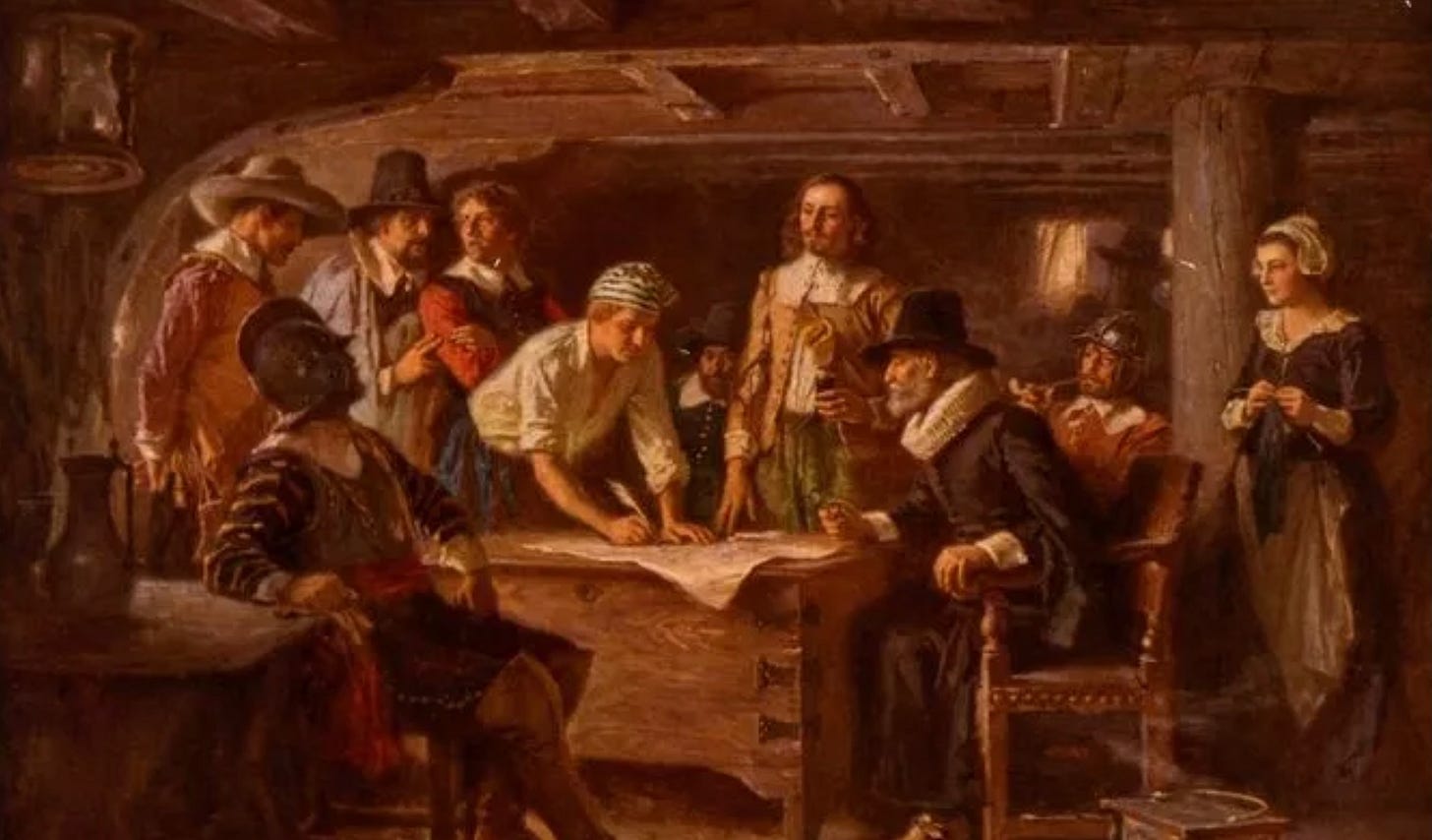History Adrift
Context and multiple perspectives from reliable sources are important when learning history. Parents might have to present the complete picture.
Signing the Mayflower Compact, 1620 by Jean Leon Gerome Ferris (1899)
When my child was in elementary school in California, I volunteered in her class every week. One day during a small group reading exercise just before Thanksgiving break, the children read about the Mayflower. The worksheet claimed that when the Pilgrims reached the New World, they “gave thanks to the ship”—and that was somehow clumsily tied to the Mayflower Compact.
Later at home, I researched the Mayflower Compact and the passengers of the Mayflower to make sure that what I knew about them was accurate. Then, in order to correct the misinformation she’d picked up at school, I had a conversation with my daughter, and we read a children’s story about the first Thanksgiving by a well-known historian. I wanted her to know about the events leading up to the first Thanksgiving and that the Mayflower Compact was a precursor to the Constitution in that it was the first written framework for self-government in the New World. And the Pilgrims and others aboard gave thanks to God for safe passage across the ocean—not to the ship.
Over the years, our family has had several such conversations to provide a holistic understanding of important moments in history, and when my child was eleven, we began using resources outside of school that have made that job much easier. One example of a resource that has become invaluable to our family as we seek to understand the many sides of U.S. and world history is the free online program of college courses taught by professors at Hillsdale College.
Some of the things I love about Hillsdale College are that the school has strong anti-slavery roots, and its 1850 charter “was the first in the United States to prohibit discrimination on the basis of gender, race, or religion.” Additionally, it is one of the few colleges in the nation to reject all money (and the strings attached) from the federal government. The college diligently educates students about the nation’s founding from an originalist perspective so they can graduate with a strong understanding of our founding documents and what makes America unique in the world.
It’s been painless but important to incorporate these classes into our daily lives; we watch the lectures at breakfast (usually during the weekdays), and if breakfast doesn’t last long enough to complete the lecture and quiz, we just pause it and roll it over to the next day’s breakfast.
Another bonus is that I’m learning alongside my daughter—hearing many details about our nation that I either tuned out in school or was never taught. And the classes go into great depth on topics that a classroom teacher couldn’t possibly cover in a school year given the amount of material they’re required to teach. Some of the courses we’ve completed are: Introduction to the Constitution; Congress: How it Works and Why it Doesn’t; The U.S. Supreme Court; American Heritage: From Colonial Settlement to the Current Day; and An Introduction to C.S. Lewis: Writings and Significance. The lectures continue to spark relevant conversations with my child about important topics, framing our understanding of history together.
Maybe this is an idea that would work for your family; maybe it’s not—but it’s an out-of-the-box solution for rounding out a child’s knowledge of history that I wanted to share. Maybe you have other ideas or a favorite resource for supplementing what your kids are learning in school—or maybe your school already does a fantastic job teaching history (we’ve experienced that, too!). Please share what you use with your children in the comments, if you like.



Amy, great message.
While at the Naval War College in 1999 - a priceless education about world history and geopolitics I wish every American could receive - I would relate a story about what I learned that day at the dinner table with my wife and children. How Athens overreached during the Sicilian Expedition. The exploits of Joshua Lawrence Chamberlain at Little Round Top. How Japan defeated Russia on the battlefield and high seas but lost the peace. Stirring human stories of daring and folly, full of lessons.
Our two naval officer sons cite those times as vital to their worldview, and another son who did not serve loves to bring his friends by to discuss world events and how nation-states deal with conflict, now with adult beverages. There is an appetite for these human stories that history courses - if there are any left in high school and college - do not address.
Enjoy those precious dinner table moments.
I respect and have confidence in Hillsdale College.
Thanks for sharing the resources you have found helpful, Amy Haywood.